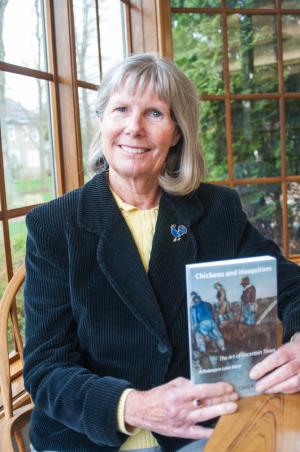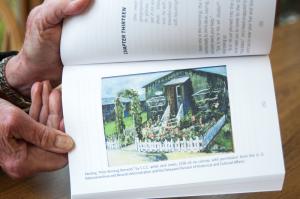Chickens and Mosquitos: New book describes 1930s Sussex
“Chickens and Mosquitos: The Art of Uncertain Times” is an enlightening work of historical fiction recently published by author Carol Psaros, a resident of Bethany Beach and a Delaware native.
“It’s a love story about depression-era Delaware,” said Psaros. “It was a very uncertain time.”
Psaros based the story on her parents’ resilient relationship during The Great Depression in Sussex County.
After the stock market crash of 1929, the economy was in collapse and millions were unemployed. When President Roosevelt took office in 1933, he started a number of work programs to employ those people and jumpstart the economy. The Civilian Conservation Corp was one of these programs.
“The C.C.C. was for unmarried, unemployed men, aged 18-25. The men were paid $30 a month, all of which was sent back to their families, except for the $5 they were allowed to keep themselves,” Psaros explained.
Delaware had eight C.C.C. camps, most of which were mosquito control efforts, which mainly consisted of digging drainage ditches. Lewes itself was severely infested with mosquitos at the time. There were also reforestation camps at Redden Forest. Psaros’s father was a member of the C.C.C.
“When I retired and had time to go through my dad’s scrapbooks, I was amazed at what I found,” she said.
One of his many assignments in the C.C.C. was mosquito control at Camp 1224, which existed where today is Huling Cove, on Route 9. The book includes the art of painter Jack Lewis, a lifelong friend of Psaros’s father, who met when Lewis was hired to paint the workers at Camp 1224.
Also occurring in 1930’s Sussex County was the beginning of the chicken industry, when Cecile Steele mistakenly ordered 500 chicks instead of 50 and quickly realized chickens were more lucrative than eggs. Delaware’s poultry industry was soon booming, in addition to the industries it brought with it, like feed companies, crate-makers, and eventually processing plants.
“Sussex was an action-packed place in the 30’s!” said Psaros.
The place to be in the 30’s in Sussex County was not oceanside, but Oak Orchard, according to Psaros. The beach was segregated at the time and the African-American section, Rosedale Beach, brought in big-name jazz musicians like Duke Ellington and Louie Armstrong. Oak Orchard boasted beaches, piers, a carousel, a bathhouse, and restaurants.
The book also touches on the beginnings of the DuPont nylon plant in Seaford and its part in the war effort.
Psaros retired as Assistant Secretary of Education of Delaware, after a long career of teaching, coaching, counseling, and administrating in Delaware schools. She and her husband, Perry, live in Bethany and have two grandchildren.
“Chickens and Mosquitos” is available at Bethany Beach Books, Browseabout, Biblion Books of Lewes, and on www.amazon.com.





















































